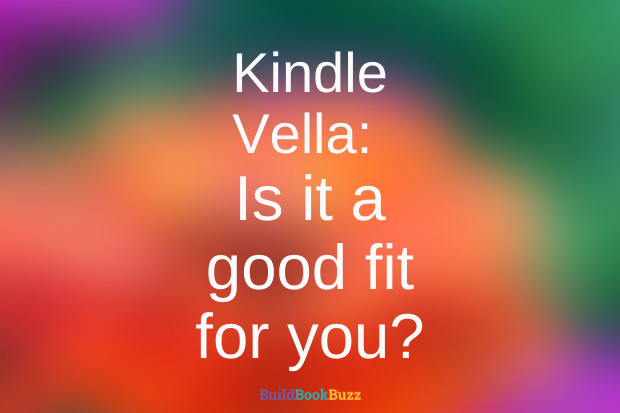Kindle Vella: Is it a good fit for you?
Have you heard about Amazon’s new Kindle Vella program?
According to Amazon’s announcement, “Kindle Vella is a new storytelling option from Kindle Direct Publishing to self-publish serialized stories, one short episode at a time. Readers will access Kindle Vella stories in the Kindle iOS app and on Amazon.com.”
Authors can use it now to begin building an inventory of serialized stories. Amazon will launch it to readers this summer.
 Kindle Villa from the experts’ perspective
Kindle Villa from the experts’ perspective
When it comes to providing insights and advice, I’m a big believer in staying in your lane. This topic is outside mine, but it’s an important one that I don’t want to ignore.
Because of that, rather than researching this myself, I’m connecting you with Kindle Vella summaries provided by experts I trust.
Here’s a quick review of their articles on the subject and a link to the full text of each.
Reedsy, “What is Kindle Vella? And Should You Join as an Author?”
Read this first. It’s the most thorough explanation of how the program works and whether there’s income-generating potential for you.
Pay close attention to the section titled, “How do Vella authors get paid?” It offers specifics I haven’t seen in any other Vella analysis.
Kindlepreneur, “Kindle Vella: Description, Features, and Tips for Authors”
Kindlepreneur is great at breaking things down step-by-step, and this article is no exception.
Writer Jason Hamilton’s long article answers all of your questions before you know what they are. Bookmark this one for its nuts-and-bolts perspective.
CreativIndie, “How to publish serialized short fiction with Kindle’s new ‘Vella’ program”
Derek Murphy comes at this from the viewpoint of an author who plans to leverage it immediately.
Murphy is planning to write three serialized stories:
- Epic fantasy
- Hardcore thriller
- Serial-killer suspense
He offers a good overview of Kindle Vella competitors — serialization sites that are already well-established with readers who like this format.
Is it for you?
Are you and what you write a good fit for this new Amazon platform? It’s worth exploring if you:
- Write fiction
- Create stories that can be serialized
- Write for a young audience
- Are comfortable using KDP’s publishing platform
- Have a following you can market to
It’s important to either be writing for young readers already, or be able to do it — not everyone can. For the most part, baby boomers aren’t reading serialized fiction on their phones so if that’s who you want to write for, move along. There’s nothing for you here.
Are you going to give this a try? Please tell us in a comment why you’ll explore this interesting new platform.
Like what you’re reading? Get it delivered to your inbox every week by subscribing to the free Build Book Buzz newsletter. You’ll also get my free “Top 5 Free Book Promotion Resources” cheat sheet immediately!


Thank you for this overview, Sandra! I wonder if Kindle Vella content must be fiction? I write non-fiction and I could see great applications for serialized content in my niche!
I wondered about that, too, Amy. I think it’s possible that your content could be rejected because it’s nonfiction, but that’s just a guess based on the information Amazon has posted about the platform. I think the real question is: Should you? Nonfiction readers aren’t going to be searching for content on the Kindle Vella app, so you’d have to work REALLY, REALLY hard to drive your target audience to it. Will the payoff be there? I love a creative take on things, but this might be trying to cram a round peg into a square hole.
Sandy
Thank you, Sandra! I’ve read a few articles about Kindle Vella, focusing on Jason Hamilton’s perspective. My biggest concern revolves around editing each individual chapter without reading the entire story. Also, I would not ask my editor to twiddle her thumbs while she waits for me to send her the next chapter? The only way I see this working is to write a complete story, send it to my editor, and then release one chapter at a time. I’d much rather publish the book and move on.
Deborah
Yes, writing the whole story first makes the most sense for you. But it also sounds like the format isn’t a good fit for how you like to work, so trust your gut.
Sandy
Deborah, I thought more about your comment later because the piece about manually dripping out content didn’t make sense. It should be automated, right? So I investigated. You can upload an entire book (as long as it hasn’t been published elsewhere), then schedule each episode to go live at specific times — say, one episode a week. So…no worries about your editor twiddling her thumbs.
Sandy
You gave me an idea: a complete novel, with a young Mexican-American protagonist (early 20s), sits on my hard drive because it never found a home when I was still looking into traditional publishing – and then I jumped heart and soul into the mainstream trilogy I’m still working on.
There were no places to publish it way back in the beginning of the century, but I’ve often wanted to go back because of the protagonist.
It MIGHT be suitable for this platform.
The biggest problem is always the same: marketing. Finding the first readers for something new, takes time, effort, and serendipity. But the actual story is in the can. Huh.
Thanks!
It has potential, Alicia! I agree with you on finding those readers. It’s a challenge no matter what platform you’re using. Good luck!
Sandy
I’ve read a few serials on Radish and readit. I didn’t think they were edited. It seemed like the words were jumbled I skipped those areas because I liked the stories. I’m still trying to figure out if this is for me or not. I’m a fast writer, so that’s not the problem, when I’ve been on Radish I didn’t have to wait for chapters. The one I had To wait for I didn’t finish reading because I thought that was stupid waiting 24 hours to read a chapter.
You might want to check to see if you can set it up so that people don’t have to wait for the next installment.
Sandy
Vella is an asinine idea and WHEN— not if— it fails, remember that I said it first.
Item: A book is not written chapter by chapter. Poor writers do this. Authors do not. Every “author” (really, they’re all wannabe bloggers) I see gushing over this ludicrous delivery method thinks they can grunt out a chapter and toss it up without considering timelines, flow, editing, continuity, or even consistency within the lore of their own universe. Competent professional authors make mistakes with full editing staffs while writing a book as a whole— you want to do it in pieces?!
Item: Serial fiction has been tried before with writers such as Stephen King and Piers Anthony. It failed. If they can’t make it work, you won’t, either. Wattpad and Blogger are full of two chapter long “novels” abandoned by writers with good ideas and no clue how to organize them or even write them coherently.
Item: Readers will stop buying serial fiction the very first time the author of a book they’re reading misses an update. John Scalzi was almost dropped by his publisher for missing five deadlines on the “Interdependency Trilogy” because he couldn’t stay off Twitter. That’s a guy who was under CONTRACT.
Item: We don’t even wait for entire TV show seasons any more, and you ninnies think someone is going to wait a month for the next chapter to your YA dystopian vampire romance story?
Item: Authors make a payout of around $0.000475 per word. You’re not making a car payment with that. It’s not even worth the time to write it.
Write your book. Edit it. Publish it. Stop looking for shortcuts.
If I sound pissy about this it’s because it’s a pathetic Amazon cash grab attempt. Few authors of any quality will write (and if you’re not already published with an established reader base, I’m talking about you— and your blog doesn’t count.) Because of this, the reflected value is low, so readers won’t buy. This makes it a death spiral. Why would I waste my time and money buying one chapter of a book that may never be finished when I could spend about the same amount for a full novel, such as John Conroe’s “Zone War” at $0.99 per book?
I understand your logic, but not your anger. Thanks for sharing your perspective.
Sandy